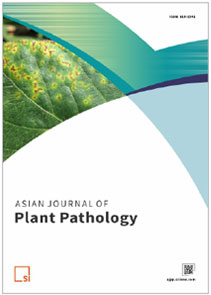Principles of Transparency and Best Practice
Name of the Journal: The unique title of the journal 'Asian Journal of Plant Pathology' distinguishes it from other journals, making it easy for authors, reviewers, editors, and the global audience to identify and recognize it.
Website: The website of Asian Journal of Plant Pathology is managed using the comprehensive services of SciOne . This system offers a complete range of services, including manuscript submission, peer review, content hosting, analytics, and identity management. We have made every effort to ensure that our website is free of misleading content that could potentially deceive authors, readers, and editors. Additionally, we strictly prohibit any attempt to imitate the website of another journal or publisher.
Publishing Schedule: Asian Journal of Plant Pathology is an online-first journal that is committed to providing the latest research findings as soon as possible. Our journal publishes one volume per year, ensuring that readers have access to the newest developments in their field. We strive to maintain transparency and accuracy in all aspects of our publication process to promote trust and confidence in the research community.
Archiving: The published content of Asian Journal of Plant Pathology will be securely stored and protected by the Asian Digital Library in the event of the journal's discontinuation. This ensures that all archived material will remain accessible through the Asian Digital Library and preserved for future reference.
Copyright & Licensing: Asian Journal of Plant Pathology is an Open-Access journal that ensures complete transparency regarding copyright and licensing information, which can be found on its website. All articles published, whether in web or PDF format, contain relevant licensing details for the convenience of the readers.
Peer Review Process: To ensure the highest level of quality, all submitted content, excluding editorial materials, undergoes a rigorous peer-review process at Asian Journal of Plant Pathology. This process is well-defined and strictly adhered to, and is publicly accessible on the journal's website under the heading of "Peer Review Process and Policy." The review process is carried out in a transparent and accountable manner, ensuring the credibility and reliability of the content published in Asian Journal of Plant Pathology.
Access: The online version of Asian Journal of Plant Pathology is accessible to readers without any charge, whereas the print edition is exclusively available to subscribers only.
Ownership and Management: Asian Journal of Plant Pathology maintains editorial independence with highly experienced and recognized experts in their respective fields serving on the Editorial Board. The journal's editorial page provides detailed information about the editorial team, including full names, affiliations, and any relevant digital identifiers.
Advisory Body / Editorial Board: The Advisory Board/Editorial Board of Asian Journal of Plant Pathology comprises highly experienced and recognized experts in their respective areas of research. The Board is responsible for advising and guiding the journal's policies and procedures, including the peer review process, editorial decisions, and strategic planning. The Board is composed of scholars from a diverse backgrounds, reflect the multidisciplinary nature of the journal. Members of the Advisory Board/Editorial Board are selected based on their expertise, reputation, and adherence to ethical standards. They are appointed by the Editor-in-Chief and serve a term of three years, which may be renewed upon mutual agreement.
Editorial Team/Contact Information: The website of Asian Journal of Plant Pathology features an editorial board page that provides a list of all editorial board members along with their complete names and affiliations. Additionally, the journal offers comprehensive contact information for its editorial office, including a complete mailing address, on the website.
Author Fees: Asian Journal of Plant Pathology does not charge any fees for manuscript submissions or the publication of declined manuscripts. Furthermore, there are no additional costs based on the size of an article, figures, or supplementary data. The publication charges for accepted manuscripts are clearly listed on the journal's Publication Fee page, which is accessible to all authors, ensuring transparency in the submission process.
Waiver Policy: Asian Journal of Plant Pathology is committed to ensuring that all researchers have the opportunity to publish their work in our open-access journal, regardless of their financial situation. Therefore, we offer fee waivers to authors who may not be able to afford the publication fees.
Authors who are unable to pay the publication fee may submit a request for a waiver during the submission process. Waiver requests will be reviewed by our editorial team on a case-by-case basis, taking into consideration the author's financial need, the quality of the submission, and the potential impact of the research.
Furthermore, authors from low-income countries, as defined by the World Bank , are eligible for an automatic waiver. Additionally, authors who are members of an institution with a low-income economy may also be eligible for a waiver.
Other Revenue Sources: Asian Journal of Plant Pathology has declared the following additional revenue sources:
- Advertising: Occasionally, Asian Journal of Plant Pathology may publish paid job offers or announcements regarding conferences to generate revenue.
- Reprints: Asian Journal of Plant Pathology offers a paid reprint service to authors and organizations who wish to distribute their published articles. This service generates revenue that helps cover the day-to-day expenses of the journal.
- Print Subscription: The print subscription service is one of the revenue streams offered by Asian Journal of Plant Pathology to meet its financial requirements. We provide a high-quality print version of the journal to our subscribers at a reasonable cost.
Direct marketing: At Asian Journal of Plant Pathology, we send personalized emails to our registered members based on their interests. We ensure that we limit these invitations to a maximum of 30 per day and provide a straightforward opt-out option through their profile page. We never engage in sending unsolicited emails or spam.



